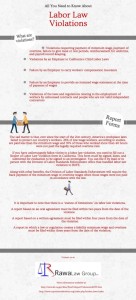THE INCORRECT STANDARDS TO DETERMINE THE EMPLOYMENT STATUS
Just because your employer treats you as an independent contractor, it does not mean that you are an independent contractor. Although your employer may treat you as an independent contractor, such as paying you without withholding  any tax deductions for the services you provide, and reporting your income to the IRS and FTB using form 1099 rather than a W-2, these actions have no significance whatsoever in determining employment status. Your employer cannot change your status from that of an employee to one of an independent contractor by illegally requiring you to assume a burden that the law imposes directly on the employer, that being, withholding payroll taxes and reporting such withholdings to the taxing authorities. Even if your employer made you sign a written agreement that you are an independent contractor and not an employee, the written agreement, per se, may not be enough to determine your employment status. California courts will look beyond the written agreement and examine the facts that characterize the actual relationship between the parties and make the determination as to employment status based upon their analysis of such facts and application of the appropriate law.
any tax deductions for the services you provide, and reporting your income to the IRS and FTB using form 1099 rather than a W-2, these actions have no significance whatsoever in determining employment status. Your employer cannot change your status from that of an employee to one of an independent contractor by illegally requiring you to assume a burden that the law imposes directly on the employer, that being, withholding payroll taxes and reporting such withholdings to the taxing authorities. Even if your employer made you sign a written agreement that you are an independent contractor and not an employee, the written agreement, per se, may not be enough to determine your employment status. California courts will look beyond the written agreement and examine the facts that characterize the actual relationship between the parties and make the determination as to employment status based upon their analysis of such facts and application of the appropriate law.
WHY WOULD YOUR EMPLOYER WANT TO TREAT YOU AS AN INDEPENDENT CONTRACTOR?
Employers oftentimes improperly classify their employees as independent contractors for the following reasons:
- Employers do not have to pay payroll taxes on the compensation paid to independent contractors.
- Employers do not have to comply with the minimum wage or pay overtime rate.
- Employers do not have to provide independent contractors with meal periods and rest breaks.
- Employers do not have to reimburse independent contractors for business expenses incurred in performing their jobs.
- Employers do not have to provide independent contractors with workers’ compensation insurance.
- Employers are not liable to independent contractors for payments under unemployment insurance, disability insurance, or social security.
- Anti-discrimination and retaliation laws which protect employees do not apply to independent contractors.
Some of the factors the court looks at in determining the employment status California Labor code 3357. “Any person  rendering service for another, other than as an independent contractor, or unless expressly excluded herein, is presumed to be an employee”. California court applies the “multi-factor” or the “economic realities” test adopted by the California Supreme Court in the case of S. G. Borello & Sons, Inc. v Dept. of Industrial Relations (1989) 48 Cal.3d 341. In applying the economic realities test, the most significant factor to be considered is whether the employer has control or the right to control the worker both as to the work done and the manner and means in which it is performed. Other factors that may be considered depending on the issue involved are:
rendering service for another, other than as an independent contractor, or unless expressly excluded herein, is presumed to be an employee”. California court applies the “multi-factor” or the “economic realities” test adopted by the California Supreme Court in the case of S. G. Borello & Sons, Inc. v Dept. of Industrial Relations (1989) 48 Cal.3d 341. In applying the economic realities test, the most significant factor to be considered is whether the employer has control or the right to control the worker both as to the work done and the manner and means in which it is performed. Other factors that may be considered depending on the issue involved are:
- Whether the worker is engaged in an occupation or business distinct from that of the employer.
- Whether or not the work is a part of the employer’s regular business.
- Whether the employer provides the instrumentalities, tools, and the place for the work;
- Whether your employer provides the equipment, materials or helpers required by you for work.
- Whether the service rendered requires a special skill;
- Whether your employer gives direction and supervision to the worker or not.
- The length of time for which the services are to be performed;
- The degree of permanence of the working relationship;
- The method of payment, whether by time or by the job; and
- Whether your employer retains control over the operation as a whole, and
- Whether the worker’s duties are an integral part of the operation.
Call us FREE at 844-444-1400 for a FREE Consultation
Other Cities That We Service: Fontana, Rancho Cucamonga, Ontario, Victorville, Hesperia, Chino,Los Angeles, Long Beach, Glendale, Pasadena, Inglewood, Santa Ana, Anaheim, Newport Beach, Irvine, City of Orange,Huntington Beach, Garden Grove, Oceanside, Costa Mesa, San Diego, Chula Vista, El Cajon, Pomona, El Monte Downey,West Covina, Orange County, Fullerton, Riverside, Moreno Valley, Corona, Murrieta, Temecula, Hemet, San Bernardino, Chino Hills
